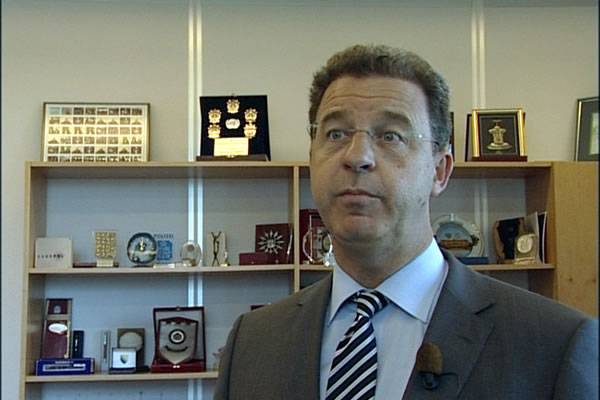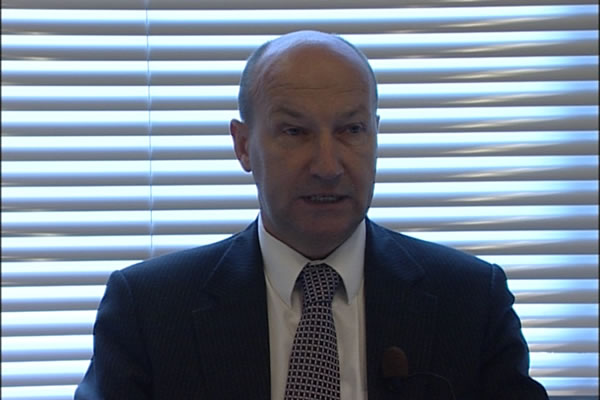Home
BRAMMERTZ: TOO EARLY TO SAY HOW THE TRIAL WILL BE ORGANIZED
In his statement for tonight’s edition of Tribunal, a TV program produced by SENSE Agency, Chief Prosecutor Serge Brammertz notes that the prosecution ‘is looking at a number of options’ as to how the trial of Ratko Mladic will be organized. ICTY Registrar John Hocking adds that "whatever Mladic needs in terms of medical assistance, he will receive".
 Serge Brammertz, chief prosecutor in the Tribunal
Serge Brammertz, chief prosecutor in the Tribunal ‘I am not really surprised with the arrest. As you know, we were waiting for this moment for many years’, Tribunal’s chief prosecutor Serge Brammertz said for tonight’s edition ofTribunal, a TV program produced by SENSE Agency. Brammertz admitted Mladic managed to slip through on a number of occasions, but that he was "pleased that this time it had worked and that the arrest had took place", after "16 years". ‘The Serbian authorities have fulfilled an important obligation’, the chief prosecutor said,adding, ‘of course I'm confident and very much hope that the same efficiency will be shown in the arrest of Hadzic’.
Commenting on Mladic’s arrest, former chief prosecutor Carla Del Ponte and Karadzic’s legal advisor Peter Robinson broached the possibility that the two cases might be joined and Karadzic and Mladic tried together. Brammertz refused to discuss it, noting instead that the prosecution ‘is looking at a number of options’. As he said, there ‘are a number of possibilities’ as to how the trial can be organized. Brammertz also warned that now ‘it's really too early to say how the trial will be organized in what kind of context’. In Brammertz’s view, the most important thing is to complete the proceedings in Belgrade and have Mladic in The Hague as soon as possible. ‘Appropriate decisions’ will be taken then, he said.
John Hocking, Tribunal’s Registrar, agrees with Brammertz’s view of the situation. Speaking to SENSE, Hocking said, ‘upon [Mladic’s] transfer to the Tribunal he will have his initial appearance and then there will be a very vigorous period of pre-trial activity and it's during this pre-trial activity that the judges will be able to make a determination as to the scope of his trial, how long will this trial take, how long will it take to conduct the trial’. As he said, ‘the arrest of Ratko Mladic was always a part of the completion strategy of the Tribunal’; ‘it’s critical that all of those persons indicted by the Tribunal are tried by the Tribunal’.
As the Registrar stressed, ‘we are waiting for the information from Belgrade authorities as to [Mladic's] state of health and as soon as we have that, the medical services here will assess what type of procedures or what sorts of facilities need to be available to him upon his arrival". According to Hocking, doctors will examine Mladic as soon as he is transferred into the ICTY custody in the Tribunal and he will receive all the medical assistance he needs. Hocking noted that the health of the detainees was a key responsibility of the Registry, adding, ‘all of our detainees have available to them the best medical service that the Dutch health system can provide’.
‘In fact it's quite common, a lot of our detainees come to the Tribunal when they are transferred [with] pre-existing medical conditions and their state of health in fact improves during their stay in the detention unit for exactly that reason, the quality of the medical services that the host state, the Dutch provide to the detainees’, Hocking concluded.
Photos
Linked Reports
- Case : Mladic
- 2011-05-26 CHARGES AGAINST RATKO MLADIC
- 2010-05-13 MLADIC’S AND KARADZIC’S INDICTMENTS TO BE BROUGHT INTO LINE
- 2004-12-13 “BLACK HOLE” IN RATKO MLADIC’S CAREER
- 2011-05-31 RATKO MLADIC IN TRIBUNAL’S CUSTODY
- 2011-06-01 BRAMMERTZ: MLADIC’S ARREST CAME LATE BUT NOT TOO LATE
- 2011-06-03 MLADIC POSTPONED PLEA ON ‘OBNOXIOUS’ CHARGES

